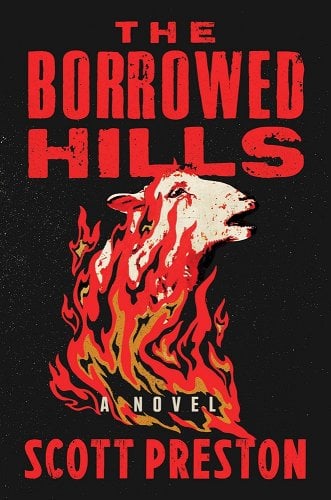Features:
- Set in England’s Lake District (Cambria) during the early 2000s and the outbreak of foot and mouth disease
- Explores themes of isolation, loss, struggle, violence, and the old world meeting the new
- Illicit activities in a place where local rules and tradition are often more respected than the law
- Heavy and visceral, but quietly beautiful
The rolling hills of Cambria are picturesque to offcomers, but those trying to eke out a living on that unforgiving land know looks are deceiving. I wouldn’t go so far as to call The Borrowed Hills a love letter to this region of England, but it captures both the beauty and bleak nature of the land and how it has shaped the people living there. This book is dark and can feel almost oppressive at times, but it also does a wonderful job shedding some light on struggles we don’t often hear about or see. It is definitely not for the squeamish as you are often deep in the muck along with the characters and the sheep culling at the beginning of the book is described in great detail. I have mixed feelings about this book, but it is definitely impactful.
Pro: Honesty is the best policy
Steve Ellimen returns home to Northern England in order to help his aging father with lambing season only to have the whole herd culled after an outbreak of foot and mouth disease. The terrible ordeal brings him into the orbit of another farmer, William Herne, and his wife Helen. Slow to bounce back after such a catastrophe, William and Steve find themselves drawn into sheep rustling and a much darker criminal world. The deeper they go in the name of survival, the further they find themselves from the traditions and values that keep them tied to the land they are fighting for.
This book is a snapshot of life in the English countryside unlike any book I have read. It is a strangely visceral experience that is equally beautiful and brutal. Despite the level of detail provided, nothing feels overdone or overly dramatic in the writing. The same treatment is given to the main characters who have been shaped by this harsh landscape and a way of life that has been passed down for generations. They have their own style of communicating and a certain sense of stoicism and dark humor shaped by lifelong struggle. Though the reader is kept at about as far a distance as they keep from each other, you still get a good sense of who these people are, especially as parts of this identity are challenged.
A quick shout out should also go to how this book handles the tension between the old world and the new. We get a little of it in the form of tourists and outsiders passing through the small village to sightsee and how some of the area is slowly transformed. However, it comes to play unexpectedly through the illegal activities William and Steve find themselves participating in as well. It is funny how this made me start to think about certain crimes as being acceptable while others being completely out of sync with the way things ought to be without the book having to over explain it. It is definitely something that will sit with me for a while.
The Breakdown: Following like sheep
There are a lot of things in this book that I usually really enjoy and would tempt me to give it a perfect rating. However, for some reason, this book wasn’t really for me. There is nothing glaringly obvious as to why that is, but there were many times that it was a struggle to get through. After some reflection, I think it comes down to the main character; Steve. Even before the culling of his father’s herd, Steve seems to lack much ambition, opinion, or direction. He doesn’t want to be part of life in Cambria, but he keeps finding himself back there. The main problem I think I have is that for a large chunk of the book, Steve doesn’t act like a player in his own life and just seems to wander until something happens to shift his direction. This story is narrated by an older Steve, so it is bound to have some of that quality. However, it goes beyond just the narration style in a way that probably bothered me more than I care to admit. There were a few moments where I felt like maybe he had started to discover some of that fire and direction, only to have it be a fleeting thing.
Steve’s general attitude of wandering lost through life makes him susceptible to influence with those by more ambition and/or direction. In this case, that person is William Herne. Even in the beginning, the two are not really friends but are still connected as shepherds struck by the same tragedy on the same land their families had been for generations. I think there’s something powerful in that connection, but I does not come through as strongly in the story. William embodies the stoic and somewhat ornery shepherd character well, but there’s nothing about him that makes him a compelling person to follow. I liked his wife, Helen, but she doesn’t really have this quality either. As a result, it just kind of seems like Steve gets drawn in because that is what is most convenient and that made some of his later development feel a little less sincere.
Special thanks to NetGalley for providing this ARC in exchange for an honest review!
